When I was last in Bangkok, I met with writer and freelance journalist Tom Vater. I hadn’t realized until then that Tom had also written a novel set in the milieu of the long-term travel/backpacker scene – The Devil’s Road to Kathmandu. I will save some words of praise about Kathmandu for another post, because there was something that came up in that conversation on the Middle-Eastern dog-leg of Soi 3, Sukhumvit, over chicken curry, dal bhat and naan, that I’ve thought about several times since. We were comparing threatened getaways. Tom mentioned a couple of spots in India; I parried with a few of my own in Yunnan. I said I was pessimistic about where it all was heading – that just as there was a sense that everywhere was being invaded, there was simultaneously a sense that the glory days of individual travel were over, that it was all going to the dogs and we’d all end up having to go “home”. That, I added, was in part what my novel Harvest Season was about.
Tom flashed a cheeky grin and demurred: “No,” he said. “I just think there’ll be a lot less people traveling and those that do will be the adventurous ones who started it all in the first place. You’ll retreat to your getaway somewhere in China, and then someone else like you will turn up. Andthat’s when it will get interesting.”
I thought this was a wonderful idea – and still do. I mean, MSN Travel – somebody forwarded me the link – just listed Thailand as No 5 among the most dangerous destinations in the world. Imagine if they all stopped going – “more than 14 million … in 2007, more than 800,000 of them British”, the article tuts at the reader. Yes, a serious cut back would be terrible for the Thai tourism industry and probably for the Thai economy in general, but for me and Tom (and anyone else who might be reading this) it would be just like the old days.






